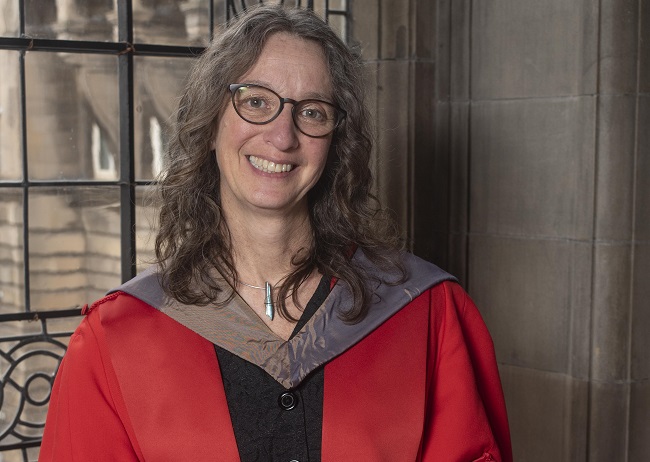Refugee rights champion continues pioneering work with renewal of prestigious UNESCO Chair
Published: 9 June 2024
Professor Alison Phipps continues her pioneering work in support of refugee rights with the renewal of her prestigious UNESCO Chair at the University of Glasgow.

Trailblazing academic Professor Alison Phipps continues her pioneering work in support of refugee rights with the renewal of her prestigious UNESCO Chair at the University of Glasgow.
The announcement comes during the Refugee Festival Scotland, an arts and community festival which takes place every year across the country, in the lead up to World Refugee Day, on 20 June
The Chair, initially established in 2016 as the UNESCO Chair in Refugee Integration through Languages and the Arts, has been expanded to encompass education, reflecting Professor Phipps and her team’s vital role in educating on the issues faced by refugees and migrants.
The renewed Chair will now be officially known as the UNESCO Chair on Refugee Integration through Education, Language, and Arts, while retaining its popular acronym RILA. This renewal recognises the important work Professor Phipps and her team have undertaken in using creative and educational approaches to support the integration of refugees and migrants not just in Scotland but across the world.
Professor Sir Anton Muscatelli, Principal and Vice-Chancellor of the University of Glasgow said: "We are delighted to have the UNESCO RILA Chair renewed and expanded to include education. Professor Phipps has been a true pioneer in this field and the achievements of the UNESCO Chair have been considerable in helping advance our civic mission and role as a University of Sanctuary.
“This renewal is testament to the global impact of Professor Phipps’ work and advocacy to foster an environment of inclusion, and to the University's commitment to supporting refugees, asylum seekers and those experiencing forced migration. I wish to congratulate Professor Phipps and her team and wish them well as they develop their broad portfolio of activity."
Since her initial appointment in 2016, Professor Phipps has coordinated groundbreaking research, training, and documentation on how arts, languages, and now education can help vulnerable refugees and migrants integrate into host communities. Her work has involved partnering with various agencies and organisations across different nations, including the Scottish Refugee Council, the Red Cross, and the Iona Community.
Professor Phipps said: “The whole team and the School of Education are thrilled at this renewal and the formal expansion of our work to include education. The restorative impulse of the teams’ work and leadership from people who have sought refuge will mean our work can strength and serve the UNESCO values in Scotland, with New Scots, and globally through our partners.”
Professor Phipps has been at the forefront of developing multilingual and creative hubs of activity to enable refugee integration. Her efforts have extended beyond Scotland, with collaborations in Ghana, working with the University of Ghana and the Noyam African Dance Institute, and in Gaza with the Islamic University of Gaza.
The renewal of the UNESCO RILA Chair ensures that Professor Phipps and her team can continue their vital work, exploring innovative ways to leverage education, languages, and the arts to support the successful integration of refugees and migrants into their new communities.
The UNESCO RILA team are based in the University’s School of Education and due to its international and cross disciplinary research also work in the University’s Advanced Research Centre (ARC).
In 2012, Professor Phipps received an OBE for Services to Education and Intercultural and Interreligious Relations in the Queen’s Birthday Honours. As co-founder of Glasgow Refugee, Asylum and Migration Network, Professor Phipps is also an Ambassador for Scottish Refugee Council. She is a Fellow of the Royal Society of Arts, the Academy of Social Sciences, and a recipient of the Royal Philosophical Society’s Minerva Medal.
In 2022, the University was awarded University of Sanctuary status in recognition of its commitment to supporting people who have experienced forced migration. University of Sanctuary status recognises good practice in organisations that facilitate access to higher education for refugee communities. It is part of the City of Sanctuary UK initiative, which promotes the UK as a welcoming place of safety for all.
First published: 9 June 2024
<< June

